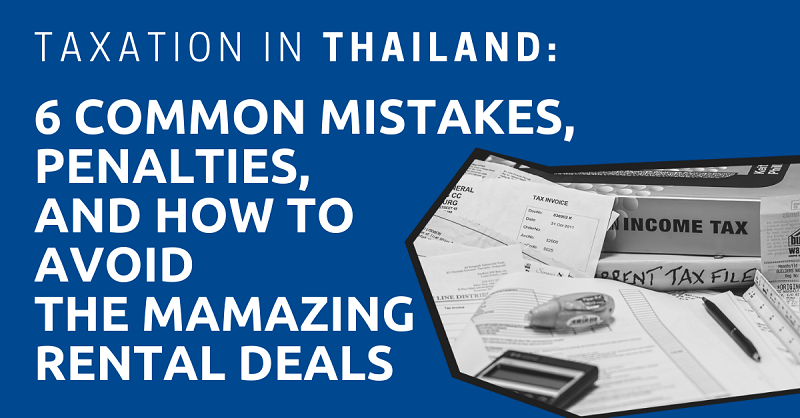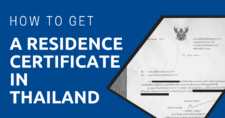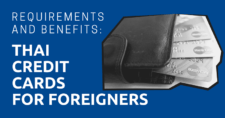
Taxes are an unavoidable yet complicated part of doing business in Thailand. There are over 7 chapters and 143 sections in the Revenue Code of Thailand. Because of this, you may fail to follow some rules without even meaning to do so.
One minor tax mistake could have more impact on your business than you’d imagine. It may lead to problems with the Revenue Department. And this is the last thing you want. Fixing mistakes is a lengthy process costing valuable time and money.
This article will guide you through the common tax mistakes—and the penalties you may suffer from making such mistakes—while running a company in Thailand.
Don’t have a business in Thailand? You can read this article on Thailand income tax for foreigners instead.
Do not forget to check out our premium subscription on the business tier. It gives you access to exclusive business content with insider business tricks to help you do a business here based on our experiences running a business in Thailand for more than 10 years.
"*" indicates required fields
Disclaimer: This article may include links to products or services offered by ExpatDen’s partners, which give us commissions when you click on them. Although this may influence how they appear in the text, we only recommend solutions that we would use in your situation. Read more in our Advertising Disclosure.
Contents
We have exclusive business content with insider business tricks that you can’t find anywhere else.
By becoming a subscriber of our Business tier, you can get immediate access to this content:
- Karsten’s List of Personal and Professional Services
- A Step-by-Step Guide to Registering a Company in Thailand on Your Own
- Taxes You Have to Deal with as a Business Owner in Thailand
- Employee Regulations You Must Know as a Business Owner
- Increase Your Chances of Getting Tax Refunds for Your Company
That’s not all. You get a free consultation with a corporate lawyer, a free consultation with an accountant, enjoy ExpatDen ad-free, and get access to over a hundred pieces of exclusive content to make your life in Thailand hassle-free.
Here is the full list of our exclusive content.
To get access to these exclusive business guides and more, become a subscriber.
Common Mistakes
In Thailand, tax mistakes happen for many reasons. Some by accident, some on purpose. But as you’ve seen from the above info, it’s best to avoid these common tax mistakes below.
VAT Registration
It’s not necessary to do a VAT registration right after setting up a company in Thailand. However, without it, the company is unable to collect withholding tax from buyers or customers and can’t issue a tax invoice. This shouldn’t be a problem unless the revenue grows to over 1.8 million baht a year.
In accordance with Thai Revenue Department regulations, all companies in Thailand have to do a VAT registration within 30 days after annual revenue exceeds 1.8 million baht.
Failing to do so results in a penalty of two times the tax rate from any revenue over 1.8 million baht, with a 1.5% interest added to that every month.
Creating Fake Invoices
Taxable income in Thailand has a progressive rate and is calculated from the company’s income, deductions, and expenses. This means the more profit the company gets, the more taxes the company has to pay. This leads some people to create more expenses by issuing fake invoices, thinking they’ll pay significantly less corporate tax.
But never issue fake invoices since it’s against Revenue Department Section 65. Doing so is a crime in Thailand and land you in jail for seven years per single fake invoice. In addition, your company will be penalized at 1.5% interest per month.
An official way to decrease your company corporate income tax is to increase the company expense. One way to do that is to buy group insurance for your employees.
Withholding Tax Deductions
Withholding tax is quite a headache. The majority of company services are subject to withholding tax, or WHT. The company needs to collect WHT on behalf of the Revenue Department for any service provided. Then the company needs to report and pay the WHT to the Revenue Department every month.
Each type of services has a different rate, which can be checked from the Revenue Department’s website. In addition, withholding tax certificates need to be issued for every deduction.
The withholding tax rate between renting a normal office is also different from a serviced office.
Forgetting to deduct withholding tax, not issuing a tax certificate, or not giving a monthly report to the Revenue Department are subject to both imprisonment and fines. Moreover, the company needs to pay two times the withholding tax that originally needed to be paid.
Issuing Invoices
If the company issues an invoice that is different from the Revenue Department’s standards, there is a 2,000 baht penalty per invoice. An invoice is defined as all documents that are related to finance, including tax invoices, tax certificates, debit notes, credit notes, and more.
In case the company intentionally doesn’t issue an invoice to avoid paying taxes, the penalty includes both a seven year imprisonment and 200,000 baht fine, in addition to the two times tax rate that needs to be paid with 1.5% interest per month.
Delayed Tax Payments
Taxes need to be filed and reported to the Revenue Department at the beginning of every month. There is a 1000 baht to 2000 baht fine with a 1.5% monthly interest rate per case.
All types of company, including the BOI-promoted company need to do it.
Remember that there are easily more than three types of taxes the company needs to deal with depending on their provided services. It’s important to carefully check with an accountant on how many tax types your company is subject to.
You can check our tax calendar to let you know which tax you need to file and when to do it.
E-commerce Websites
All e-commerce websites in Thailand need to be registered with the Department of Business Development thirty days after the site is created. The penalty of not registering your e-commerce website is a 2000 baht fee with a daily fee of 100 baht. Although the penalty itself is not high, the company may run the risk of encountering unexpected problems when dealing with any government organizations.
Common Penalties
This section includes both direct penalties, such as fines and imprisonments, and indirect penalties, such as tax refund issues and work permit cancellations for common taxation mistakes.
In addition to the penalties below, there are issues that are not directly related to the Revenue Department. When mistakes happen, you may need to dig out and prepare a mountain of tax documents, resulting in huge losses of time and money.
Think about the money you’d have to spend hiring the right person to deal with Revenue Department officers. Or think about having to approach the Revenue Department yourself.
Knowing these penalties are important when you run your business in Thailand.
Fines
The penalties for failing to follow tax laws in Thailand normally is a fine ranging from 1,000 baht to 200,000 baht, depending on the seriousness of your case. For example, delaying in filing monthly tax paperwork with the Revenue Department comes with a 1,000 baht fine. Whereas creating a fake invoice may result in a 200,000 baht fine.
In addition to the fixed fines, there is an interest rate of 1.5% per month. The interest is calculated right after the taxation mistake occurs. If you don’t deduct withholding tax, create fake invoices, or don’t issue invoices, you need to pay two times the tax amount that originally needed to be paid.
Imprisonment
Imprisonment is another common penalty for failing to follow tax laws in Thailand. Even a small case like forgetting to deduct withholding tax in a single invoice may give you one month in jail.
Tax Refunds
This is an indirect penalty that’s not mentioned in the Revenue Code of Thailand. A minimal taxation mistake may further slow down your tax refund, which is already a very slow process. Sometimes you might not get a tax refund at all because of it. This means a huge loss of money since the amount of tax refund can be easily over 100,000 a month depending on the income of your corporation.
We have exclusive business content with insider business tricks that you can’t find anywhere else.
By becoming a subscriber of our Business tier, you can get immediate access to this content:
- Karsten’s List of Personal and Professional Services
- A Step-by-Step Guide to Registering a Company in Thailand on Your Own
- Taxes You Have to Deal with as a Business Owner in Thailand
- Employee Regulations You Must Know as a Business Owner
- Increase Your Chances of Getting Tax Refunds for Your Company
That’s not all. You get a free consultation with a corporate lawyer, a free consultation with an accountant, enjoy ExpatDen ad-free, and get access to over a hundred pieces of exclusive content to make your life in Thailand hassle-free.
Here is the full list of our exclusive content.
To get access to these exclusive business guides and more, become a subscriber.
Asset Seizure
Revenue Department has the right to seize your assets when you’re unable to pay taxes and fines. Worse yet, they have the power to seize your assets immediately, without having to wait for court judgement.
Work Permit Cancellation
Not paying taxes the right way may result in having your work permit cancelled. At the very least, the latest year of tax certificates and financial statements are required to issue or extend a work permit in Thailand.
Warning
While it’s tempting not to follow all complicated tax matters, a single tax mistake can severely impact your business.
Although you might want to save cost of running a business, sometimes the error happens simply because you’ve never heard of one of the tax rules. To prevent, it’s better to hire a professional accountant to handle your tax matters.
Hiring an accountant also has other benefits. They provide advice on how to decrease taxable income, how to get more money from tax refunds, and they even assist you with work permit and visa issues.
If you want more advice on how to manage taxes for your company, reach out to Banchee Legal House. Having a dedicated firm to help you with your taxes lets you focus on what matters—running your business in Thailand.
Disclaimer: We are neither corporate lawyers nor accountants. This article was written based on our experience and research while running a business in Thailand for over 10 years. It should give you ideas on how to avoid tax issues in Thailand. However, mistakes and misunderstandings happen. Always fact check with a professional.
Accounting Firms in Thailand
Banchee Legal House

A law firm in Bangkok with a broad range of legal and business services to offer their clients.
Contact Banchee Legal House






